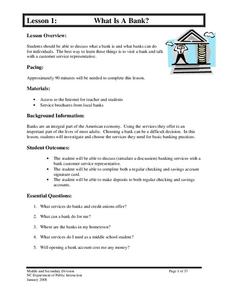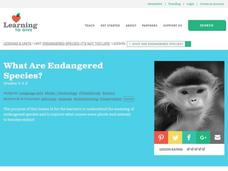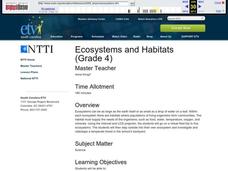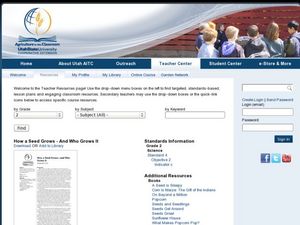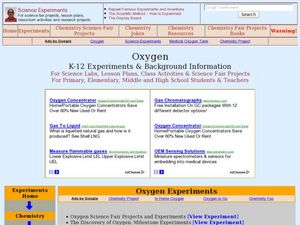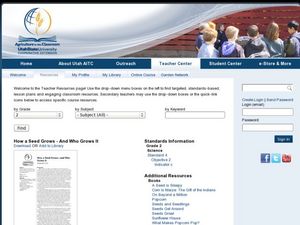Curated OER
It's Always Great to Hear "Another Book Please!"
Although summer is gone, these tips for increasing literacy can be used year-round.
Curated OER
Turtle and Tortoise Preschool Lesson Plan
One of the best parts about teaching the littlest learners is that you can create thematic lessons that use one topic to address every subject. Here is a nice set of thematic teaching ideas that uses turtles and tortoises to teach...
North Carolina Department of Public Instruction
What Is A Bank?
You're never too young to learn about banking and personal finance. Use a set of seven banking lessons to teach middle schoolers about checking and savings accounts, interest rates, loans and credit cards, and safety deposit boxes.
North Carolina Consortium for Middle East Studies
Missing Pieces of the Puzzle: African Americans in Revolutionary Times
What's missing from most studies of the American Revolutionary War is information about the role African Americans played in the conflict. To correct this oversight, middle schoolers research groups like the Black Loyalists and Black...
Nemours KidsHealth
Car and Bus Safety: Grades K-2
Nearly every child will ride in a car or take a bus during their elementary career, that's why it is so important to teach them safety skills. First, little ones discuss why safety rules are important. Then, they go over rules that will...
Curated OER
Big Challenges for Children of the World
International Children's Day offers a glimpse into the issues that children around the world face because of poverty, war, or poor medical care.
Curated OER
What Are Endangered Species?
Students explore the concepts of endangered and extinct animals. In this animal protection lesson, students discuss and define the words endangered, extinct, and habitat. Students share why they think it is important to protect...
Curated OER
Sun Seeking Plants
Pupils investigate the story "The Tiny Seed" by Eric Carle. This story is used to introduce the children to the concept that seeds change and grow into plants when conditions in the environment including temperature, light, water and...
Curated OER
Parts of a Plant
Students explore biology by listening to an in-class lecture. For this plant science lesson, students sing songs with their classmates regarding anatomical parts of a plant and create plants from arts and crafts materials. Students...
Curated OER
Finding Caterpillars
Students examine how animals protect themselves from predators and camouflage themselves. They participate in a simulation in which they locate red and green yarn "caterpillars," organize their data, and generate a bar graph using...
Curated OER
Because of Winn Dixie: Water Management Practices
Fourth graders read the book Because of Winn Dixie and define the characters, setting, and plot. In this Winn Dixie lesson plan, 4th graders also identify quality water management techniques addressed in the story.
Curated OER
Ecosystems and Habitats
Fourth graders go on a virtual field trip to five ecosystems. They investigate and videotape a temperate forest in the school's backyard.
Curated OER
Tree Friends
Students are introduced to tree structure and use. They identify their special tree using all senses except sight. Students identify six different internal parts within a cross section of tree trunk (bark, phloem, xylem, cambium,...
Curated OER
How a Seed Grows: And Who Grows It
Second graders explore botany by viewing video clips in class. In this seed growth lesson plan, 2nd graders identify the types of seeds that grow specific plants and what the optimal conditions are for growing seeds. Students view a...
Curated OER
Personality Development
Students participate in a variety of activities to help them define their own personalities. They complete questionnaires, play personality Bingo, and compare kaleidoscopes and candy to the variety found in humans.
Curated OER
Aerobic and Anaerobic Conditioning
Students view the A.D.A.M. computer simulation of aerobic and anaerobic exercise. They break into groups and members brainstorm and list as many aerobic and anaerobic exercises as possible in five minutes.
Curated OER
Oxygen
Students explore oxygen and its physical and chemical propeties. In this investigative lesson students complete several experiments using oxygen.
Curated OER
What is An Insect?
Students investigate the concept of an insect. They conduct research about six different insects and identify the different body parts. Students look at the life cycle of the developing monarch butterfly. They also use the library to...
Curated OER
Bluebirds
Students use the internet to gather information on bluebirds. In groups, they observe and record the size, color and various sounds of the birds. They view photographs of the birds in different stages of development and discuss how...
Curated OER
How a Seed Grows and Who Grows It
First graders explore biology by viewing PowerPoint presentations in class. In this plant life lesson, 1st graders identify the life cycle of a plant and how to properly plant a seed outside. Students view a movie about plant life and...
Curated OER
Little Red Hen
First graders explore biology by identifying plant anatomy in class. In this botany lesson, 1st graders read the book The Little Red Hen and identify the methods used in order to grow successful plants. Students discuss other ways people...
Curated OER
Where Do Your Veggies Grow?
First graders investigate the origins of vegetables. In this Science lesson, 1st graders identify where fruits and vegetables come from. Students describe how people utilize plants.
Curated OER
VERTEBRATES
Seventh graders describe the main characteristics of warm-blooded vertebrate animals. They compare and contrast the two different groups of warm-blooded vertebrate animals by looking at external, reproductive, and growth characteristics.
Curated OER
Exploring Community History and Cultural Influence
Students explore cultural attributes. In this cultural diversity lesson, students define culture and discuss the diversity of culture that exists in the world. Students determine whether or not there is an American culture.




